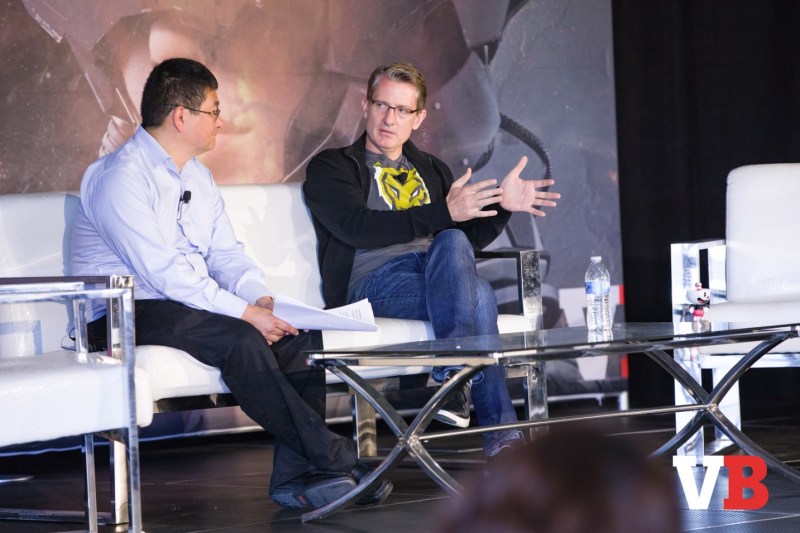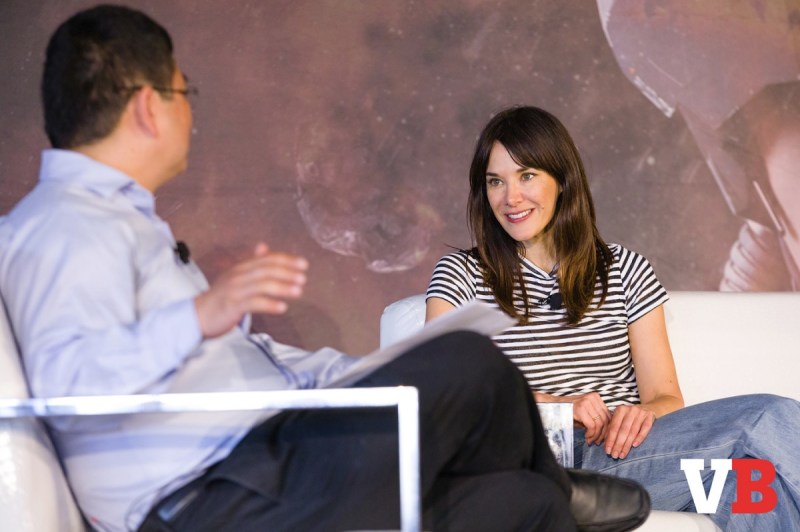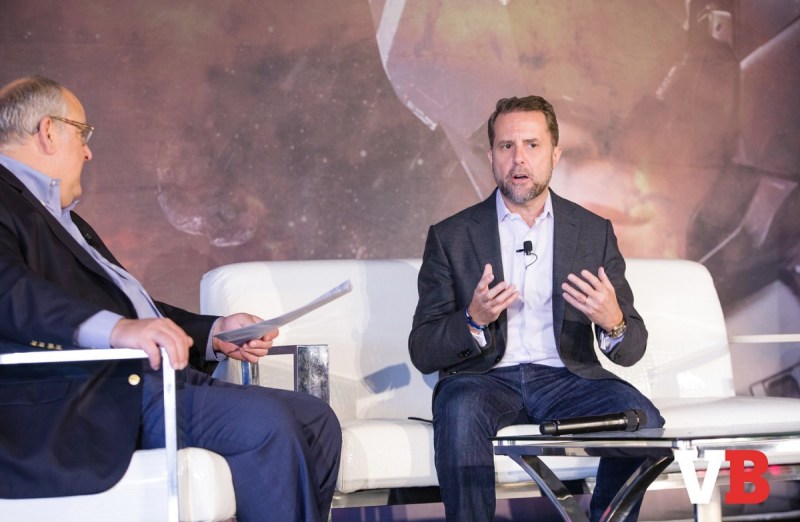Each year, we hold our GamesBeat Summit event to gather the best thinking about where gaming is going. This week, at our fourth annual summit and 10th year of GamesBeat events, we heard dozens of intellectually stimulating talks from 82 speakers at our GamesBeat Summit 2018 event in Mill Valley.
It was interesting to see so many different paths about gaming’s future recommended by the veterans of the industry. Robot Cache’s Brian Fargo believes that setting up alternative distribution to today’s app stores is possible with the disruptive technology of blockchain and cryptocurrency. Andrew House, former head of Sony’s game business, said in his first post-Sony interview that he believes the consoles could be disrupted by streaming set-top boxes. Kent Wakeford, cofounder of KSV Esports, noted that the amount of capital flowing into esports signals the dawn of something big.
The variety showed that innovation and the chance for strategic differentiation is alive and well in games. I’ve collected a few of the interesting moments below. I’ve picked these insights not because they were the most brilliant, but because they showed the breadth of thinking and opportunities across gaming. We’ll be posting more insights from other speakers in the future, particularly as our videos of the talks are processed.
Brian Fargo does blockchain

Above: Perrin Kaplan interviews Brian Fargo at GamesBeat Summit 2018.
Fargo has been making games for decades and is known as the founder of game publishers such as Interplay Productions and InXile Entertainment, but lately he has been running Robot Cache, a maker of an upcoming blockchain-based app store. While current stores such as Steam take a 30 percent cut, Robot Cache plans to take only 5 percent and give 95 percent to the game publishers or developers.
Fargo will let players resell their games at prices set by the publishers, and in that case, 5 percent goes to Robot Cache, 25 percent goes to the player, and 70 percent (about the same that publishers get with the current app stores) goes to the publisher. That’s potentially disruptive, as reselling games has worked with physical media but not in the digital space.
Blockchain enables this since it’s unhackable (so far) and transparent and accurate when it comes to identifying the correct owner of a digital asset, such as a game, Fargo said. Several major publishers like 505 Games, Paradox, and THQ Nordic announced their support for it recently.
“It’s a whole paradigm shift to allow the resale of a game,” Fargo said. “The variable that got them over the hump is the publisher controls all the variables, or how the resell gets done. They had to control that. What will happen is they will start to play with those dials and that it where it gets interesting to me.”
It will come down to Fargo’s relationships with publishers, and his decades-long reputation will help with that.
“I don’t claim that we’re going to take out Steam,” Fargo said. “We don’t need to be Netflix, but can we be Hulu?”
Kent Wakeford on the flow of capital into esports

Above: Kent Wakeford of KsV Esports speaks at GamesBeat Summit 2018.
Kent Wakeford joined Kabam cofounder Kevin Chou in shifting from mobile games into esports. They founded KSV Esports together, fielded an esports team in the Overwatch League with an estimated $20 million investment, and started adding multiple teams in a variety of esports game genres. They moved fast into the space in the past year, but Wakeford said such speed was necessary as esports begins its meteoric rise.
He noted that market researcher Newzoo predicts esports revenue will rise from $906 million in 2018 to $1.5 billion to $2.4 billion in 2020, and the audience size is expected to grow from 380 million total viewers today to more than 550 million by 2021. He noted an average fan monetizes in traditional sports at around $50 per fan, compared to just $5 per esports fan. That tells you the potential for esports to grow.
“There’s this big gap, and if you can come in and close it. It’s this 10x opportunity,” Wakeford said.
New England Patriots owner Robert Kraft started a team with an Overwatch franchise. Multiple NBA franchises have also moved in to compete in NBA 2K. And the professional wrestling company WWE has taken a stake in esports team Cloud9.
And he said that the capital flowing into the industry is just beginning. The venture capital money going into startups is a fraction of the money coming into esports.
“It’s tens if not hundreds of millions of dollars shifting into esports from traditional sports teams,” Wakeford said. “When you think of the investment into esports venues, that’s another huge wave of capital coming in.”
Esports arenas are popping up in Las Vegas, Los Angeles, and all over China, Wakeford said. When you add all of this up, you get a staggering amount of investment.
Jade Raymond sees ‘network model’ for Triple-A games

Above: Jade Raymond of Electronic Arts speaks at GamesBeat Summit 2018.
Jade Raymond started programming as a 12-year-old girl and dreamed of making video games. She moved into the industry and landed at Ubisoft, making the Assassin’s Creed game, which eventually became a huge franchise. She shifted into leadership roles, built some huge studios at Ubisoft and she’s doing it again as senior vice president and group general manager at Electronic Arts, where she manages studios in charge of the Star Wars games.
During that time, she has seen Triple-A games evolve from publisher-driven properties to something that is more like a “network model” of ownership.
“When you look at what players want and what they call ‘quality,’ it has changed tremendously in the last two years,” she said. “You know that everyone is talking about PUBG and Fortnite, but we used to think that triple-A quality meant how many features, how many modes, how many hours of gameplay, and how many maps. Now, players are valuing the social connection, their impact on this world, what’s my own story. And all of that can happen in one map and one mode with very few features.”
She added, “Now, it’s about how do you create a brand that can be owned by the fans and players. It’s not even just owned by players and fans but the whole ecosystem of people involved in games these days: the broadcaster, the content creator, and the modder. It’s not just the people who create the game and the people who play the game.”
Andrew House warns about streaming boxes disrupting the consoles

Above: Mike Vorhaus (left) of Magid Advisors interviews former Sony game chief Andrew House at GamesBeat Summit 2018.
Andrew House recently left Sony after 27 years at the company, most recently as the head of the PlayStation business. Not surprisingly, his favorite consoles were the PlayStation 2 and the PlayStation 4, which led market dominance for Sony, and he was pleased that Sony defied predictions that the console market was dead.
“I’m very bullish about further life cycles for consoles,” he said.
Consoles are so under-penetrated in markets around the globe, particularly emerging markets, he said. Technology hasn’t hit a wall when it comes to raising the quality of games, and the industry is only beginning to exploit the use of data to create a better experience for console gamers, House said.
He said that he believes that streaming boxes offer an opportunity to disrupt the existing players in the console business. That may be a veiled reference to the Yeti project, the secret streaming project reportedly under way at Google and headed by House’s former Sony colleague, Phil Harrison. This kind of box — which could stream games to homes much like the Nvidia Shield set-top box — could be used by the non-game giants such as Google or Amazon to lever their way into games. If you look at how streaming changed music and movies, you can see how it could change games in the same way, House said.
“If you look back over console gaming history, there are certain inflection points where the industry can be upended and for new participants to emerge. One of those is when you have a wholesale shift in distribution methods,” House said. “Streaming could be another inflection point that potentially allows other players to take part.”
While some believe virtual reality has stalled, House said it was a shame that VR suffered from over-exuberant expectations and he tried himself to manage them as Sony launched the PlayStation VR headset, which has been one of the biggest successes among VR platforms. The challenge is getting people to repeat their play experiences and stay engaged longer with VR experiences.
“We are in the very early stages. There are at least one or two full hardware iterations before you are going to get there,” House said.
House was also bullish on free-to-play games on consoles, and the ability for consoles to get bigger penetration in emerging markets around the world. While consoles hit with a thud in China, they may have a place in markets like the Middle East. And House hopes that free-to-play will be a way to break the hold that dominant game franchises (like Call of Duty) have on the time of console players. He noted microtransactions can be done in bad ways (ahem, EA’s loot boxes in Star Wars Battlefront II), but he doesn’t think free-to-play will be damaging for the industry.
“Free-to-play is a way to provide a counter-weight that bodes well for the console industry,” House said.
Keisha Howard offers hope for reducing toxicity

Above: Keisha Howard and Paula Angela Escuadra speak on the diversity panel at GamesBeat Summit 2018.
Some of the fresh voices we heard at GamesBeat Summit were on our diversity panel, which explored the idea of whether gaming would have its “Black Panther moment,” a reference to the commercial success of a diverse film made by diverse creators.
Keisha Howard, founder of Sugar Gamers and The BlazeBreakers, noted that the rising commercial success of gamers as esports athletes is leading to some changes when it comes to toxic behavior online.
“Now that there is so much money flowing into esports, young kids need to understand that if they want to create a lucrative career out of gaming, they need to act right,” Howard said. “Hiding behind anonymity isn’t as easy. People understand now they can no longer hide their behavior successfully and people are calling bad behavior out. It’s not as easy as it once was to be a troll.”
Rebecca Heineman, CEO of Olde Sküül and a fellow panelist, added, “To be a pro gamer, you give up some of your privacy, that’s just the way of the beast… if you wish to have a career in esports, you need to be on your best behavior when you play. Everything is recorded, no matter what you do, what you say, someone’s going to have a recording of it. It’s going to come back to haunt you.”
In other words, as we enter the world of streaming, the camera is always on, and toxicity will become transparent and come with a price. Let us hope so.

